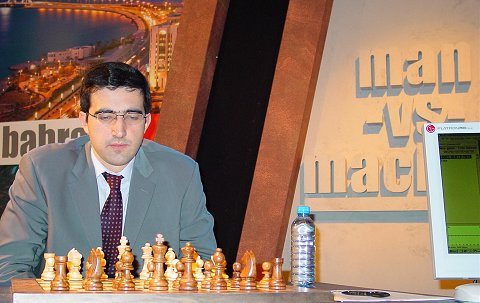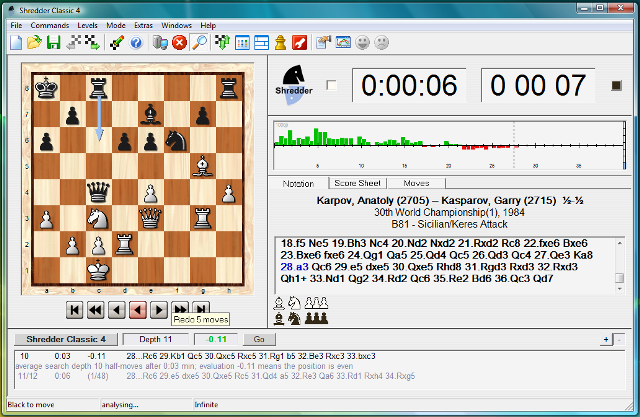Archiwum kategorii ‘Programy szachowe’
Obecnie nie można sobie wyobrazić, aby człowiek mógł wystąpić do pojedynku z jakimś programem szachowym lub komputerem. Przewaga maszyn nad homo sapiens jest decydująca.
Ale jeszcze do niedawna było to możliwe. Po przegranym meczu Garri Kasparowa z komputerem Deep Blue w 1997 roku, nowy mistrz świata Władimir Kramnik przyjął wyzwanie i stanął do rywalizacji przeciwko programowi firmy Chess Base z Hamburga Deep Fritz. Pojedynek odbył się w Bahrain w dniach 2-21 października 2002 roku.
Mecz składał się z 8 partii i wywołał wielkie zainteresowanie mediów na całym świecie. Ostatecznie padł wynik remisowy 4-4.
O tym wydarzeniu sprzed 10 lat przypomina znany publicysta szachowy Dagobert Kohlmyer z Berlina.
„Shredder” jest jednym z najbardziej znanych programów szachowych. Na mojej stronie została opublikowana interesująca recenzja Krzysztofa Kledzika na ten temat.
Niebywała sensacja – zdyskwalifikowano „Rybkę” za oszustwa w programowaniu i kazano właścicielowi zwrócić wszystkie zdobyte nagrody w latach 2006-2010. Przypominam, że właścicielem tego popularnego programu szachowego jest Vasik Rajlich – mąż naszej znakomitej arcymistrzyni Iwety Radzewicz.
Rybka disqualified and banned from World Computer Chess Championships
29 June 2011, 1.42 CET | Last modified: 11:21 | By Peter Doggers | Filed under: Reports | Tags: Computer chess
Association (ICGA) has disqualified and banned Rybka and its programmer Vasik Rajlich from previous and future World Computer Chess Championships. The ICGA accuses Rajlich of plagiarizing two other programs, Crafty and Fruit, and demands that he returns the trophies and prize money of the World Computer Chess Championships in 2007, 2008, 2009 and 2010.
For quite a while there has been some serious turmoil in the computer chess world. When we reported about the Houdini-Rybka match in February of this year, the article triggered lots of comments about the issue of cloning. Was Houdini derived from the Ippolit series? Was it plagiarized from Rybka? And what about Rybka, was it largely based on the code of other engines?
Nine days later we published an article by IM David Levy, President of the International Computer Games Association (ICGA), who shared his thoughts about how to tackle the issue. A few days later he announced the establishment of the ICGA Clone and Derivative Investigation Panel.
Not long after, on March 1st, we received an open letter about the Rybka-Fruit case signed by fourteen chess programmers. They all supported the claim that Rybka was cloned from Fabien Letouzey’s Fruit.
In the last few months all the allegations have been seriously studied by the International Computer Games Association (ICGA). On Tuesday night we received the following text from the ICGA President himself.
Rybka Disqualified and Banned from World Computer Chess Championships
The International Computer Games Association (ICGA) has been conducting an investigation into allegations that, in the chess program Rybka, the programmer Vasik Rajlich plagiarized two other programs: Crafty and Fruit. The ICGA has considered and evaluated the evidence presented to the investigation panel and the report prepared by the panel’s Secretariat. (The report and evidence files are attached.) We would like to thank those members of the panel who contributed to this investigation and the Secretariat for the enormous amount of conscientious work they have put in to this matter.
By a unanimous 5-0 decision of executive members of the ICGA we find ourselves in agreement with the verdict of the Secretariat’s report. We are convinced that the evidence against Vasik Rajlich is both overwhelming in its volume and beyond reasonable question in its nature. Vasik Rajlich is guilty of plagiarizing the programs Crafty and Fruit, and has violated the ICGA’s tournament rules with respect to the World Computer Chess Championships in the years 2006, 2007, 2008, 2009 and 2010. Specifically, Vasik Rajlich, on all five occasions, violated Tournament Rule 2 which requires that:
Each program must be the original work of the entering developers. Programming teams whose code is derived from or including game-playing code written by others must name all other authors, or the source of such code, in their submission details. Programs which are discovered to be close derivatives of others (e.g., by playing nearly all moves the same), may be declared invalid by the Tournament Director after seeking expert advice. For this purpose a listing of all game-related code running on the system must be available on demand to the Tournament Director.
By claiming other programmers’ work as his own, and failing to comply with the abovementioned rule, Vasik Rajlich has unfairly been awarded one shared 2nd-3rd place (in 2006) and four World Computer Chess Championship titles (in 2007, 2008, 2009 and 2010). Furthermore, it seems to the ICGA that Vasik Rajlich clearly knew that he was in the wrong in doing so, since he has repeatedly denied plagiarizing the work of other programmers.
The ICGA regards Vasik Rajlich’s violation of the abovementioned rule as the most serious offence that a chess programmer and ICGA member can commit with respect to his peers and to the ICGA. During the course of the investigation and upon presentation of the Secretariat’s report Vasik Rajlich did not offer, despite repeated invitations from the ICGA to do so, any kind of defence to the allegations, or to the evidence, or to the Secretariat’s report, other than to claim in an e-mail to myself on May 13th 2011 that:
Rybka has does not “include game-playing code written by others”, aside from standard exceptions which wouldn’t count as ‘game-playing’.
The vague phrase “derived from game-playing code written by others” also does not in my view apply to Rybka.
The ICGA is of the view that such a serious offence deserves to be met with correspondingly serious sanctions against the perpetrator. In deciding on appropriate sanctions the ICGA has borne in mind the approach of the International Olympic Committee for dealing with the most serious cases of the violations of its rules.
The ICGA has therefore decided as follows:
1. Vasik Rajlich is hereby disqualified from the World Computer Chess Championships (WCCC) of 2006, 2007, 2008, 2009 and 2010.
2. The 2nd-3rd place awarded to the program called “Rajlich” in the 2006 WCCC is hereby annulled, sole 2nd place is awarded to the program Shredder, and 3rd place in that event is awarded to the program Zappa.
3. The 1st places and World Computer Chess Champion titles awarded to the program Rybka in the 2007, 2008, 2009 and 2010 WCCCs are hereby annulled, and all the other programs that competed in those events are moved up in the final tournament standings by one place. Thus the revised tournament standings and titles for those events will now be as follows.
2007
1st Zappa (World Champion)
2nd Loop
=3rd GridChess
=3rd Shredder
2008
1st Hiarcs (World Champion)
2nd Junior
3rd Cluster Toga
2009
=1st Junior (Joint World Champion)
=1st Shredder (Joint World Champion)
=1st Deep Sjeng (Joint World Champion)
2010
=1st Rondo (Joint World Champion)
=1st Thinker (Joint World Champion)
3rd Shredder
4. In due course those programmers whose programs have been elevated to World Champion (or joint World Champion) status will receive from the ICGA replicas of the Shannon trophy for the appropriate years.
5. The plaques on the Shannon trophy that currently bear the name Rybka (for the years 2007-2010) will be removed from the trophy and new plaques will be engraved with the names of the revised winners of the title.
6. Similarly, the titles of World Computer Speed (Blitz) Chess Champion
that were awarded to Rybka in 2009 and 2010 are hereby annulled. The revised winners of the speed chess title for those years are therefore:
2009 Shredder
2010 Jonny and Shredder (joint champions)
7. Vasik Rajlich is banned for life from competing in the World Computer Chess Championship or any other event organized by or sanctioned by the ICGA.
8. The ICGA demands that Vasik Rajlich return to the ICGA the four replicas of the Shannon Trophy presented at the World Computer Chess Championships in 2007, 2008, 2009 and 2010, and to return to the ICGA all prize money awarded for Rybka’s performances in those events.
David Levy [President – ICGA]
June 28th 2011
Mr Levy also sent us a big number of documents which according to the ICGA form the evidence to the claim that Rybka was plagiarized from Crafty and Fruit. These documents can be downloaded below for anyone who wishes to dive further into the material.
The news is obviously a huge blow for the Rybka team. The impact in the computer chess world must be comparable to arguably the most famous example of doping in athletics: the positive drug testing of Canadian sprinter Ben Johnson in 1988. We’ve asked Vasik Rajlich for a comment and hope to add this later.











![Kopie von fritzczeslaw_front[1]](https://i2.wp.com/www.blog.konikowski.net/wp-content/uploads/2011/11/Kopie-von-fritzczeslaw_front1.jpg?resize=70%2C100)


